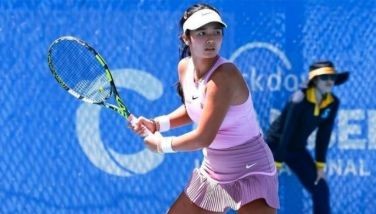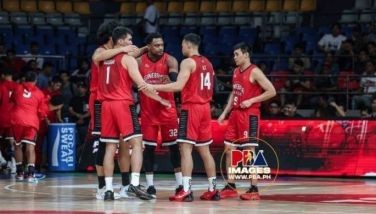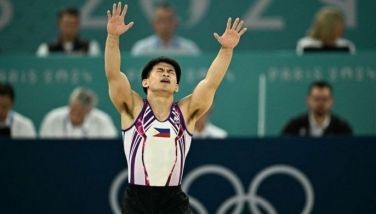Not so lonely anymore
April 23, 2005 | 12:00am
Time was when sportscasting was a very lonely profession. In all, roughly a handful of true, tested veterans populated the industry. In fact, during the 1960’s — when radio was king — you usually heard the same voices over and over again, and that etched their distinct timbre in your memory. Willie Hernandez begat other giants like the late Joe Cantada and Pingooy Pengson, and so on. In fact, radio was considered a requirement for anyone entering sports television, at least until 1987. In my opinion, making it optional made it more difficult for newcomers to adjust to the atmosphere of a live game. And there wasn’t enough work to go around. It was more of a hobby than a profession.
Veteran sports producer and announcer Howard Cosell, formerly a lawyer, took to calling it the "jockocracy", because of all the former athletes who were pulled into broadcasting major sports events. In our television networks, for example, there are almost no reporters trained in covering sports, and some networks don’t even feature sports regularly on their evening newscasts.
Today, many of those problems no longer exist. Although sports broadcasting is still not a regulated profession, it can actually be a full-time occupation, if you play your cards right. Having grown up with a previous generation that paved the way and learned the basics, there was a need to harness that vast wealth of experience, and increase the tribe, so to speak. How does one professionalize an industry?
That was the vision of the Center for Sports Communication, or CSC, assembled by a gang of sports-lovers, writers and broadcasters. CSC is holding its eighth Basic Sportscasting Seminar from May 2 to 4 at the Philippine Institute of Architects along East Capitol Drive in Barrio Kapitolyo, Pasig.
It wasn’t always easy for CSC. Although the first batch four years ago was a full class, the second which immediately followed had to be moved for lack of students. Now, they’ve streamlined their operations, and the growing list of alumni who themselves recruit students has grown formidable. And the one thing that all of us in the community have realized is that we’re all happy to share what we know. There is no monopoly on knowledge.
Batch 8 will have the following facilitators and modules: professor Sev Sarmenta will detail the history of sportscasting and broadcast ethics; The Star’s Quinito Henson elaborates on the value of research and analysis; Patricia Bermudez-Hizon talks on doing stand-uppers and interviewing; Mon Liboro expounds on his specialty, radio sportscasting; veteran sports editor Barry Pascua explains the finer points of sports writing, Benjie Santiago imparts his expertise on voice implementation; Noel Zarate tackles tandeming; Jeff Manibay teaches creative sports director, and yours truly will give a session on anchoring. PBA commissioner Noli Eala and PBL commissioner Chino Trinidad, themselves experienced broadcast professionals, have also been invited to give talks.
Two new modules will be infused, mainly dealing with building a better relationship with your partner, and ethics in real game situations. Sev and Noel will handle those classes. A lot of the fun in working a game is chemistry. It shows up on-camera.
As they say, the greatest master is not the one who produces the most students, but the one who produces the most masters. The mere fact that literally dozens of the graduates are working in the industry is proof that the program works. Even PBA and college coaches and team managers like FedEx’s Allan Gregorio and San Beda College head coach Nash Racela have taken the course. RP team assistant coach Aboy Castro and FEU assistant coach Potit de Vera are also alumni. Over thirty other announcers, reporters, writers, producers, directors and even venue announcers are all graduates.
All of a sudden, sports broadcasting isn’t so lonely anymore.
Get a first look at Kelly Williams, catch Chot Reyes’s report from the US, and learn all the latest in hoops on The Basketball Show, today at 3 p.m. over ABC 5.
Veteran sports producer and announcer Howard Cosell, formerly a lawyer, took to calling it the "jockocracy", because of all the former athletes who were pulled into broadcasting major sports events. In our television networks, for example, there are almost no reporters trained in covering sports, and some networks don’t even feature sports regularly on their evening newscasts.
Today, many of those problems no longer exist. Although sports broadcasting is still not a regulated profession, it can actually be a full-time occupation, if you play your cards right. Having grown up with a previous generation that paved the way and learned the basics, there was a need to harness that vast wealth of experience, and increase the tribe, so to speak. How does one professionalize an industry?
That was the vision of the Center for Sports Communication, or CSC, assembled by a gang of sports-lovers, writers and broadcasters. CSC is holding its eighth Basic Sportscasting Seminar from May 2 to 4 at the Philippine Institute of Architects along East Capitol Drive in Barrio Kapitolyo, Pasig.
It wasn’t always easy for CSC. Although the first batch four years ago was a full class, the second which immediately followed had to be moved for lack of students. Now, they’ve streamlined their operations, and the growing list of alumni who themselves recruit students has grown formidable. And the one thing that all of us in the community have realized is that we’re all happy to share what we know. There is no monopoly on knowledge.
Batch 8 will have the following facilitators and modules: professor Sev Sarmenta will detail the history of sportscasting and broadcast ethics; The Star’s Quinito Henson elaborates on the value of research and analysis; Patricia Bermudez-Hizon talks on doing stand-uppers and interviewing; Mon Liboro expounds on his specialty, radio sportscasting; veteran sports editor Barry Pascua explains the finer points of sports writing, Benjie Santiago imparts his expertise on voice implementation; Noel Zarate tackles tandeming; Jeff Manibay teaches creative sports director, and yours truly will give a session on anchoring. PBA commissioner Noli Eala and PBL commissioner Chino Trinidad, themselves experienced broadcast professionals, have also been invited to give talks.
Two new modules will be infused, mainly dealing with building a better relationship with your partner, and ethics in real game situations. Sev and Noel will handle those classes. A lot of the fun in working a game is chemistry. It shows up on-camera.
As they say, the greatest master is not the one who produces the most students, but the one who produces the most masters. The mere fact that literally dozens of the graduates are working in the industry is proof that the program works. Even PBA and college coaches and team managers like FedEx’s Allan Gregorio and San Beda College head coach Nash Racela have taken the course. RP team assistant coach Aboy Castro and FEU assistant coach Potit de Vera are also alumni. Over thirty other announcers, reporters, writers, producers, directors and even venue announcers are all graduates.
All of a sudden, sports broadcasting isn’t so lonely anymore.
BrandSpace Articles
<
>
- Latest
- Trending
Trending
Latest
Trending
Latest
Recommended



























